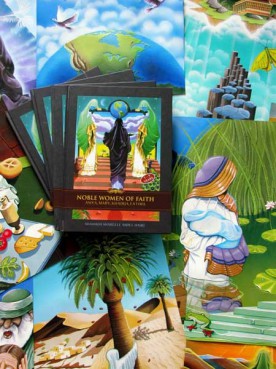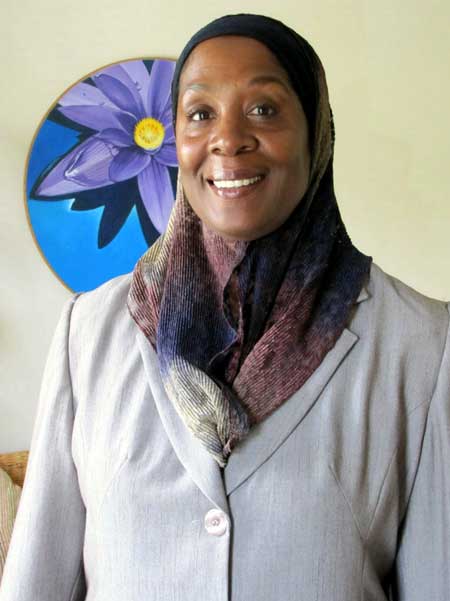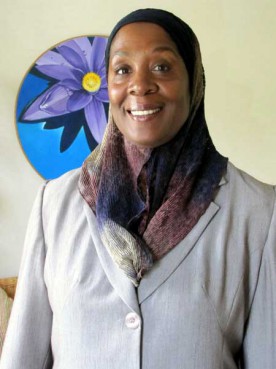(RNS) Shahada Sharelle Abdul Haqq says she became interested in studying Islam in her 20s when she learned how the Quran protects the rights of women.
Abdul Haqq laments that cultural and legal traditions in some Islamic countries contradict that egalitarian instruction. Moreover, those oppressive practices are all some Westerners know about Islamic teachings.
She set out to not only counter that impression, but also to celebrate the four “foremost women in the universe,” as a traditional teaching by the Prophet Muhammad puts it, by writing “Noble Women of Faith: Asiya, Mary, Khadija, Fatima,” a book that celebrates the lives of Islam's female role models.
The book, sumptuously illustrated with Abdul Haqq's luminous acrylic-on-canvas paintings, celebrates the women that Muhammad pointed to as providing examples of a faithful life.
“Noble Women of Faith” follows Abdul Haqq's 2008 “Stories of the Prophets in the Holy Quran,” another illustrated book aimed at children that tells the lives of the 25 male prophets mentioned in the Quran. An art teacher who grew up in San Francisco and now lives in Alabama, Abdul Haqq's paintings capture a child's wide-eyed imagined views of the ancient tales.

“Noble Women of Faith: Awiya, Mary, Khadija, Fatima,” written and sumptuously illustrated by Huntsville-based artist Shahada Sharelle Abdul Haqq, has just been published by Tughra Books.
“Stories of the Prophets,” Abdul Haqq recently learned, has become a worldwide best-seller for the Istanbul-based Tughra Books, which also has a U.S. office.
Of Islam's “four noble women,” only Mary, the mother of Jesus, is mentioned in the Quran. The other three are from the Hadith, the collected sayings of Muhammad.
Mary's story in the Quran and the Hadith differs somewhat from the Christian version. In the Quran, Mary is depicted as unmarried.
Mary's food is miraculously provided — and when villagers decry her apparent immorality for having a baby without being married, the baby Jesus himself speaks up to defend her.
One of Abdul Haqq's illustrations in the section about Mary captures that moment.
The faces of the villagers reflect their amazement and fear at hearing a baby speak. That is, the portion of the faces that you can see.
Islam takes very seriously the prohibition, found in the biblical Ten Commandments, to avoid making images. For Abdul Haqq, an African-American who was puzzled as to why the photographs of God she saw as a child in her mother's Christian church depicted a Caucasian man, this prohibition is especially understandable.
Those illustrations, she said, had the effect of excluding her and her family.
“We shouldn't be so arrogant as to think we can create,” Abdul Haqq said. “For me, this adds mystique. Others get to use their imagination based on how others around them look.”
Abdul Haqq's illustrations invite readers to imagine life in Pharaoh's Egypt, where Asiya adopts the infant Moses, or in the home of Muhammad himself, where the brave and resourceful Khadija, the prophet's first wife, and Fatima, their daughter, become the primary earthly supports and comforts of Muhammad.
The “noble women” are brave and faithful — even, especially in Asiya's case, facing awful persecutions and hardships.
“Hopefully this book will teach a lesson, give children something to dwell on,” Abdul Haqq said.
The book has been released just in time for Ramadan, the Islamic month of fasting, prayer and study that began July 20. Muslims are encouraged to read through the Quran during the month. Abdul Haqq's book will give children something to study, too.
And while the book is for all children, Abdul Haqq has been especially pleased with the early reactions from young women.
“Little girls read it cover-to-cover,” Abdul Haqq said. “This gives Muslim girls something to feel good about.”
(Kay Campbell writes for The Huntsville Times in Huntsville, Ala.)






